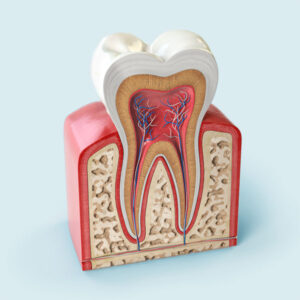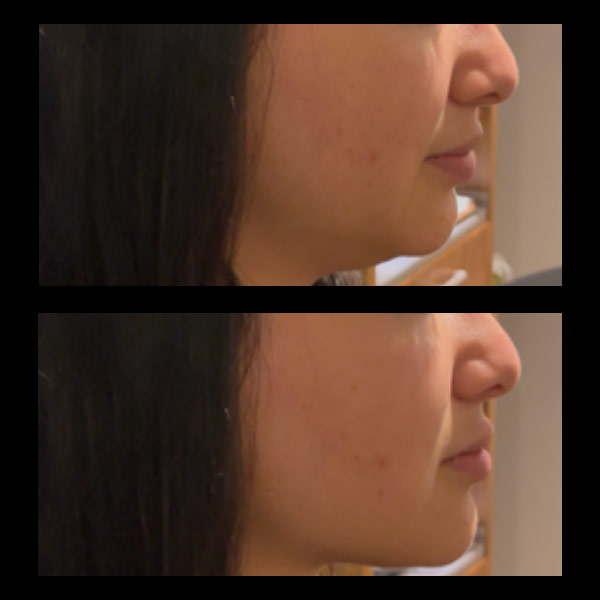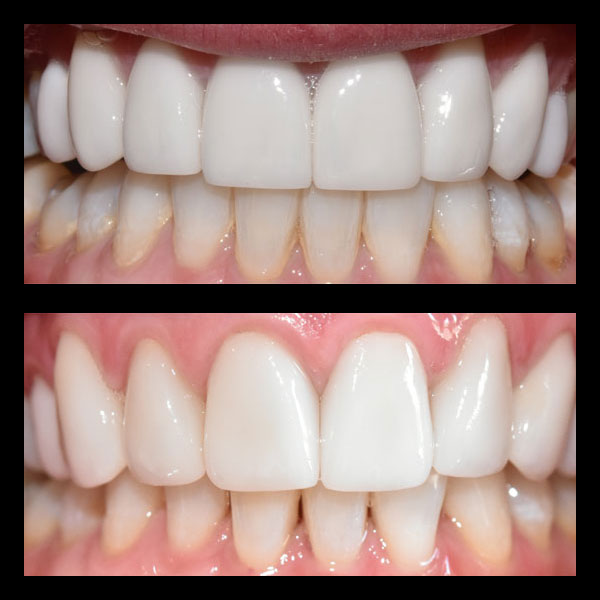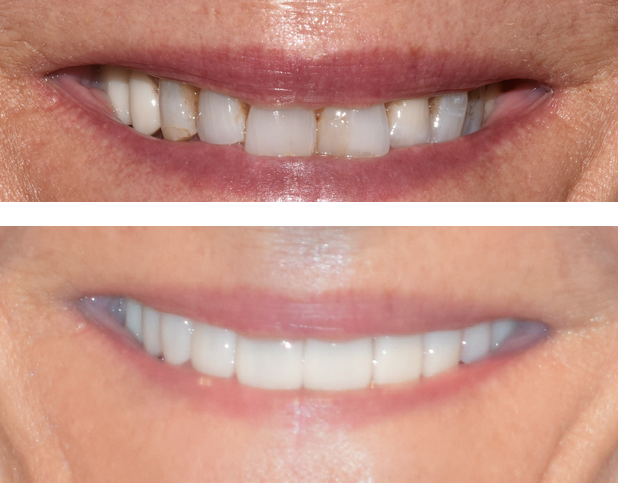
Whether savoring a hot cup of coffee on a chilly morning or a refreshing lemonade on a scorching summer’s day, simple pleasures like these can be tarnished by a sudden, sharp jolt of pain in your mouth, a telltale sign of sensitive teeth. Tooth sensitivity can significantly impact your life, making eating, drinking, and even brushing a painful experience. This is a common dental issue that many suffer from, and is caused when the tooth’s enamel wears down and exposes the underlying dentin.
While some people turn to home remedies for relief, others seek professional dental care. At-home remedies such as desensitizing toothpaste or a saltwater rinse can offer short-term relief, but the recurring sensitivity indicates that these methods only curb the symptoms without addressing the underlying cause. Professional dental treatments for sensitive teeth can both relieve the discomfort and treat the root cause. The end goal is the same: to maintain a healthy, pain-free smile.
What is Tooth Sensitivity
Tooth sensitivity, also known as dentin hypersensitivity, is a common dental condition characterized by discomfort or pain in teeth when exposed to certain stimuli:
- Temperature: Hot or cold foods and drinks.
- Sweet or Acidic Foods and Drinks: Sugary snacks, citrus fruits, or carbonated beverages.
- Touch: During brushing, flossing, or when teeth are touched.
- Air: Cold air hitting the teeth.
The pain associated with tooth sensitivity is typically sharp and sudden, but temporary. However, this discomfort, while fleeting, can significantly impact daily activities. Understanding these causes is crucial in choosing the right treatment approach.
The Root Cause of Sensitivity
 To better understand tooth sensitivity, an exploration of the tooth’s anatomy is helpful. The outermost layer of the tooth is the enamel. This layer guards against damage and daily wear. Beneath the enamel lies the dentin, which is filled with tiny tubes connecting to the tooth’s nerve center. When the enamel wears down or gums recede, the dentin gets exposed. This exposure allows environmental stimuli to reach the tooth’s nerve, which causes pain of teeth sensitivity.
To better understand tooth sensitivity, an exploration of the tooth’s anatomy is helpful. The outermost layer of the tooth is the enamel. This layer guards against damage and daily wear. Beneath the enamel lies the dentin, which is filled with tiny tubes connecting to the tooth’s nerve center. When the enamel wears down or gums recede, the dentin gets exposed. This exposure allows environmental stimuli to reach the tooth’s nerve, which causes pain of teeth sensitivity.
What Exposes the Dentin?
Several factors can lead to dentin exposure. Brushing too hard or using a hard-bristled toothbrush can wear down the enamel and cause gum recession. Acidic food and drink consumption can also erode the enamel. Teeth grinding during sleep, known as bruxism, wears down the enamel over time. Additionally, age plays a role; as we age, our gums naturally recede, exposing dentin.
Understanding tooth sensitivity is the first step towards treatment. With this knowledge, we can move beyond temporary fixes and seek solutions that address the root cause, providing lasting relief.
Home Remedies for Tooth Sensitivity
When it comes to addressing treatments for tooth sensitivity, many find relief through a variety of home remedies. These methods offer a practical approach to managing discomfort. However, it’s important to consider whether these home remedies are truly effective in tackling the underlying cause of tooth sensitivity.
Desensitizing Toothpaste
Desensitizing toothpaste is extremely accessible and easy to use. Formulated with compounds like potassium nitrate, these toothpastes block pain signals from the tooth to the nerve, effectively reducing sensitivity over time. It typically takes several applications and a couple of weeks before you will begin to experience relief. Additionally, desensitizing toothpaste does not address the root cause of sensitivity or prevent further enamel erosion or gum recession.
Soft-Bristled Toothbrush
Switching to a soft-bristled toothbrush is beneficial for preventing further enamel erosion and gum recession, reducing sensitivity over time. This is a straightforward and preventative approach with few cons. However, if damage to the enamel or gums is already significant, a soft-bristled toothbrush alone might not be enough to alleviate existing sensitivity.
Saline Solution
Rinsing the mouth with a saline (saltwater) solution is a simple way to reduce inflammation and pain, and is particularly beneficial if gum disease is a factor in sensitivity. The downside is that the relief is often temporary, and overuse can disrupt the natural balance of bacteria in the mouth. It also will not rebuild eroded enamel or reverse gum recession.
Fluoride Rinse or Gel
Fluoride treatments, available as over-the-counter rinses or gels, are excellent for strengthening tooth enamel and decreasing sensitivity. Regular use can offer significant long-term benefits in reducing tooth sensitivity. However, these treatments might not provide immediate pain relief and are more of a preventative measure against future sensitivity rather than a solution for acute discomfort.
Limitations of Home Remedies for Tooth Sensitivity
The effectiveness of home remedies for tooth sensitivity can vary greatly depending on your individual cause of sensitivity. Someone experiencing mild sensitivity due to minor enamel erosion may find substantial relief with a desensitizing toothpaste. On the other hand, those with more severe sensitivity, perhaps from significant gum recession, might not achieve the same level of effectiveness.
Consistency is key when it comes to any at-home treatments; they need to be used regularly over the long term to sustain their benefits. Lapses in their application can quickly result in the return of sensitivity symptoms.
While home remedies can be beneficial, they have their limitations, and in many cases, they act as a temporary fix rather than a permanent solution. For a more comprehensive and effective treatment, you should seek out a professional dental assessment to identify and address the specific cause of your tooth sensitivity.
Professional Treatments for Tooth Sensitivity
The road to recovering from tooth sensitivity can be shortened and even completely mitigated by professional dental treatments. Under the guidance of Dr. Priya Uppal, Incredible Smiles offers a path to effectively combat tooth sensitivity, focusing on both relief and the underlying cause.
Our approach begins with a comprehensive oral examination, crucial for accurately diagnosing and treating tooth sensitivity. We will evaluate your teeth, gums, and overall oral health, paying special attention to signs of enamel erosion, gum health, and other potential contributors to sensitivity.
The severity of tooth sensitivity varies greatly among individuals. By considering your discomfort level, frequency of sensitivity, and specific triggers, we can determine the most effective treatment plan.
Targeted, Advanced Treatments for Sensitive Teeth
Once identified, we look at what dental treatments will be most effective in addressing the cause of sensitive teeth. For instance, tooth decay-induced sensitivity may require a cavity filling or root canal treatment. For sensitivity caused by enamel erosion or gum recession, advanced treatments are necessary. Dental bonding, which involves applying a tooth-colored resin to the exposed dentin, can help in cases of enamel erosion. Gum recession cases might require gum graft surgery to cover the exposed dentin.
More comprehensive treatments like dental implants, which replace the sensitive tooth, or orthodontic treatments like Invisalign, which help align teeth properly, may be necessary for some individuals. These treatments reduce the chances of gum recession and enamel erosion.
Post Treatment
We also like to provide guidance on preventing future sensitivity. Aftercare requires a combination of proper oral hygiene habits and healthy lifestyle choices. Maintaining good oral hygiene means brushing and flossing regularly to keep your teeth clean. It’s important to remember to be gentle; aggressive brushing can erode enamel and irritate gums. A soft-bristle toothbrush removes plaque and food particles without damaging your teeth or gums.
Using a toothpaste designed for sensitive teeth could provide extra protection and help sustain the results of your treatment. Rinsing with fluoride mouthwash can also strengthen your teeth and minimize the risk of future sensitivity. Committing to oral hygiene isn’t a one-off task; it’s about regular and careful cleaning to maintain your dental health after treatment.
Together, these at-home practices not only complement the professional care received but also play a pivotal role in sustaining oral health, ensuring the teeth remain comfortable and less prone to recurring sensitivity issues. With the right care, you can enjoy your favorite hot or cold treats without discomfort.
Embrace Lasting Relief with Professional Treatments for Sensitive Teeth at Incredible Smiles
Professional treatments for sensitive teeth stand out as the most effective approach, targeting the root cause rather than offering temporary fixes like at-home remedies. With advanced dental technology, these treatments ensure precision, quicker recovery, and enhanced comfort, leading to lasting solutions and a significantly lower risk of recurrence.
Let Incredible Smiles guide you towards enduring relief and a brighter, pain-free smile, enhancing the quality of your life. Schedule a complimentary consultation today!








